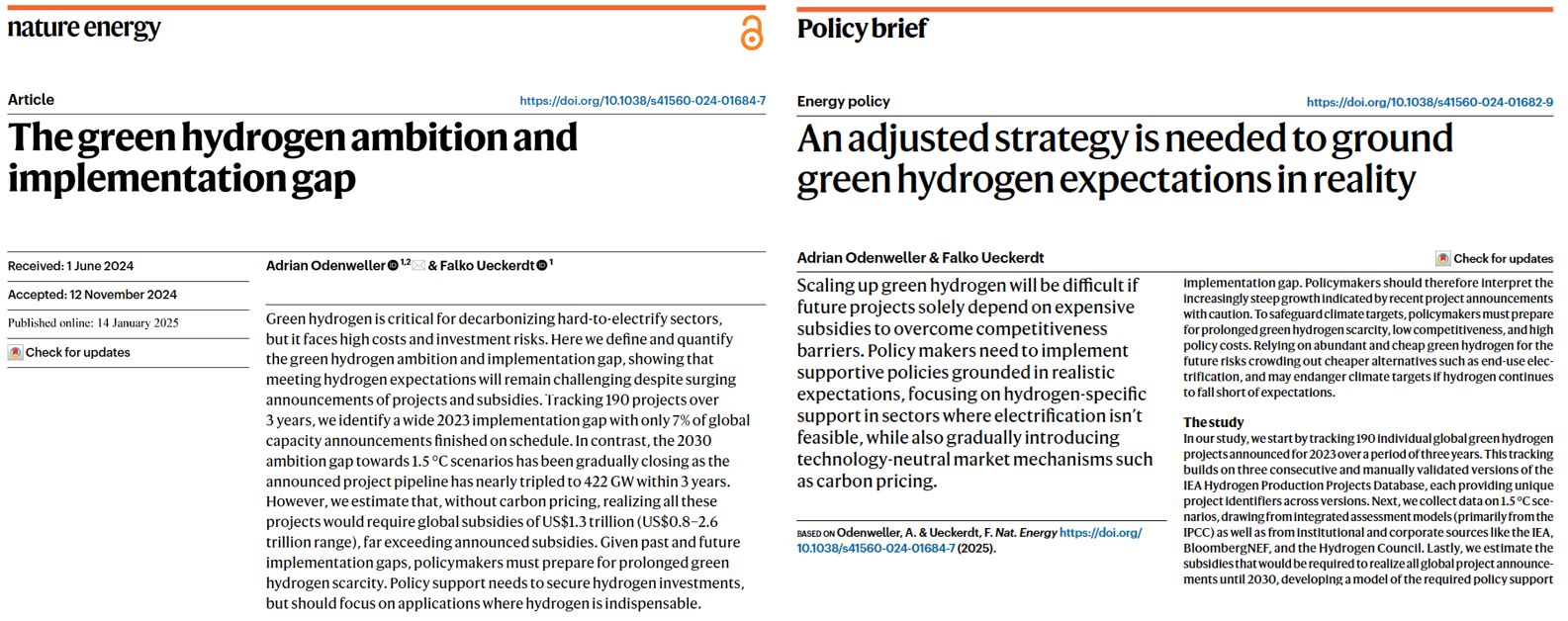Adrian Odenweller is a doctoral researcher in the Energy Transition Lab led by Prof. Dr. Gunnar Luderer at the Research Department 3 Transformation Pathways of the Potsdam Institute for Climate Impact Research (PIK). Within the Energy Transition Lab, he is part of the team on hydrogen, electrification and industry transformation, led by Dr. Falko Ueckerdt. His PhD addresses the role of sector coupling for the energy transition, including both direct and indirect electrification. Recently, Adrian focused on green hydrogen and hydrogen-based synthetic fuels (e-fuels), specifically regarding the market diffusion of electrolysers and techno-economic analyses of the green hydrogen ambition and implementation gap (see list of publications below). Furthermore, Adrian leads the development of the model coupling between PIK's energy-economy-climate model REMIND and the highly detailed power system model PyPSA-Eur.
Adrian has been a member of the Kopernikus Project Ariadne since 2020. From 2020 to 2023 Adrian received a PhD scholarship from the German Federal Environmental Foundation within the interdisciplinary programme "Environmental-social questions of the energy transition". In November and December 2022 he was a visiting researcher at Melbourne Climate Futures, University of Melbourne, Australia.
Adrian has a background in Physics (B.Sc.), Economics (B.Sc.) and Climate Sciences (M.Sc.). Before joining PIK he was a research assistant at the Max Planck Institute for Meteorology in Hamburg (2018-2020), a visiting researcher at the Cambridge Centre for Environment, Energy and Natural Resource Governance (C-EENRG), University of Cambridge (2018-2019) and a trainee at the European Central Bank, DG Statistics (2017). Previously, Adrian was also a guest researcher in the research group CoSy-CC2 at PIK's Research Department 4 Complexity Science, supervised by Prof. Dr. Reik Donner (2016-2017).
Adrian is on Bluesky, LinkedIn and Mastodon.
New highlight (January 2025)
In a new Article and Policy Brief in Nature Energy, we define and quantify three key gaps of green hydrogen. We find that hydrogen has fallen dramatically short of expectations and will continue to face challenges due a lack of competitiveness. We therefore recommend a robust political strategy that supports green hydrogen, but is based on realistic expectations about its cost and availability.
Contact
14412 Potsdam
ORCID
- Since 09/2020: Doctoral researcher, Energy Transition Lab, RD3, PIK, Germany.
- 11/2022 - 12/2022: Visiting researcher, Melbourne Climate Futures, University of Melbourne, Australia.
- 06/2020 - 07/2020: Research Associate, Research Unit Sustainability & Global Change (FNU), University of Hamburg, Germany.
- 10/2017 - 04/2020: M.Sc. Integrated Climate System Sciences, Cluster of Excellence CLICCS, University of Hamburg, Germany.
- 01/2018 - 03/2020: Research assistant, Max Planck Institute for Meteorology, Department: The Land in the Earth System, Global Vegetation Modelling Group, Hamburg, Germany.
- 10/2018-01/2019: Visiting researcher, Cambridge Centre for Environment, Energy and Natural Resource Governance (C-EENRG), University of Cambridge, UK.
- 2017: Trainee, Macroeconomic Statistics Division, European Central Bank, Frankfurt, Germany.
- 2012 - 2017: B.Sc. Physics, University of Cologne, Germany. Thesis written at PIK.
- 2012 - 2016: B.Sc. Economics, University of Cologne, Germany.
- 2014: Semester abroad, Corvinus University Budapest, Hungary.
- 2011 - 2012: Enrolled in MEng Civil Engineering, University College London (UCL), UK.
Also see Google Scholar and ResearchGate.
Work in progress / under review
- F. Schreyer, F. Ueckerdt, R. Pietzcker, A. Odenweller, A. Merfort, R. Rodrigues, J. Strefler, F. Lécuyer, G. Luderer (in review): From net-zero to zero-fossil in transforming the EU energy system. https://doi.org/10.21203/rs.3.rs-5579966/v1
- T. Zurbriggen, N. Brazzola, A. Odenweller, F. Ueckerdt, J. Rogelj (in review): Assessing the Feasibility of Economy-Scale Direct Air Capture Deployment by 2050
- A. Odenweller et al. (in preparation): REMIND-PyPSA: Bi-directional coupling of an integrated assessment model and an hourly power system model
Journal articles
- A. Odenweller, F. Ueckerdt (2025): The green hydrogen ambition and implementation gap. Nature Energy, https://doi.org/10.1038/s41560-024-01684-7.
- Covered as a Research Highlight: M. Qiao (2025): The green hydrogen implementation gap. Nature Chemical Engineering, https://doi.org/10.1038/s44286-025-00190-1
- A. Odenweller, F. Ueckerdt (2025): An adjusted strategy is needed to ground green hydrogen expectations in reality. Policy Brief. Nature Energy, https://doi.org/10.1038/s41560-024-01682-9.
- J. Biehl et al. (incl. A. Odenweller) (2023): Wicked facets of the German energy transition – examples from the electricity, heating, transport, and industry sectors. International Journal of Sustainable Energy, https://doi.org/10.1080/14786451.2023.2244602
- C. Gong, F. Ueckerdt, R. Pietzcker, A. Odenweller, W.-P. Schill, M. Kittel, G. Luderer (2023): Bidirectional coupling of the long-term integrated assessment model REgional Model of INvestments and Development (REMIND) v3.0.0 with the hourly power sector model Dispatch and Investment Evaluation Tool with Endogenous Renewables (DIETER) v1.0.2. Geoscientific Model Development, https://doi.org/10.5194/gmd-16-4977-2023
- A. Odenweller, F. Ueckerdt, G. F. Nemet, M. Jensterle, G. Luderer (2022): Probabilistic feasibility space of scaling up green hydrogen supply. Nature Energy, https://doi.org/10.1038/s41560-022-01097-4
- A. Odenweller (2022): Climate mitigation under S-shaped energy technology diffusion: Leveraging synergies of optimisation and simulation models. Technological Forecasting and Social Change, 178, 121568. https://doi.org/10.1016/j.techfore.2022.121568
- L. Baumstark et al. (incl. A. Odenweller) (2021): REMIND2.1: transformation and innovation dynamics of the energy-economic system within climate and sustainability limits. Geoscientific Model Development, 14, 6571–6603. https://doi.org/10.5194/gmd-14-6571-2021
- A. Odenweller & R. V. Donner (2020): Disentangling synchrony from serial dependency in paired-event time series. Physical Review E, 101(5), 052213. https://doi.org/10.1103/PhysRevE.101.052213
Project papers and reports (German)
- B. Pfluger et al. (incl. A. Odenweller) (2025): Hintergrundszenarien zur Festlegung des Hochlaufentgelts im Wasserstoff-Kernnetz. Gutachten im Auftrag der Bundesnetzagentur. https://www.bundesnetzagentur.de/DE/Beschlusskammern/1_GZ/GBK-GZ/2024/GBK-24-02-2%234/Downloads/Gutachten.pdf
- P. Verpoort et al. (incl A. Odenweller) (2024): Transformation der energieintensiven Industrie – Wettbewerbsfähigkeit durch strukturelle Anpassung und grüne Importe. Ariadne-Report. https://ariadneprojekt.de/publikation/report-transformation-der-energieintensiven-industrie/
- A. Odenweller, J. F. George, V. P. Müller, P. C. Verpoort, L. Gast, B. Pfluger, F. Ueckerdt (2022): Wasserstoff und die Energiekrise: 5 Knackpunkte. Ariadne-Analyse. https://ariadneprojekt.de/publikation/analyse-wasserstoff-und-die-energiekrise-funf-knackpunkte/
- R. Piria, J. Honnen, B. Pfluger, F. Ueckerdt, A. Odenweller (2021): Wasserstoffimportsicherheit für Deutschland - Zeitliche Entwicklung, Risiken und Strategien auf dem Weg zur Klimaneutralität. Ariadne-Analyse. https://ariadneprojekt.de/publikation/analyse-wasserstoffimportsicherheit-fuer-deutschland-zeitliche-entwicklung-risiken-und-strategien-auf-dem-weg-zur-klimaneutralitaet/
- F. Ueckerdt, B. Pfluger, A. Odenweller, C. Günther, M. Knodt, J. Kemmerzell, M. Rehfeldt, C. Bauer, P. Verpoort, H. C. Gils, G. Luderer (2021): Durchstarten trotz Unsicherheiten: Eckpunkte einer anpassungsfähigen Wasserstoffstrategie. Ariadne-Kurzdossier. https://ariadneprojekt.de/publikation/eckpunkte-einer-anpassungsfaehigen-wasserstoffstrategie/
- F. Ueckerdt, B. Pfluger, A. Odenweller (2021): "Kapitel 6: Wasserstoff und E-Fuels" in G. Luderer, C. Kost, D. Sörgel (Hrsg.), Deutschland auf dem Weg zur Klimaneutralität 2045: Szenarien und Pfade im Modellvergleich. Ariadne-Report. https://ariadneprojekt.de/publikation/deutschland-auf-dem-weg-zur-klimaneutralitat-2045-szenarienreport/
- New Research in Energy System Modelling (TU Berlin)
- Summer Semester 2023
- Winter Semester 2023/2024
- Summer Semester 2024
- Winter Semeseter 2024/2025
- Summer Semester 2025
Invited Talks
- Feb 2025: Council on Energy, Environment and Water (CEEW), Online
- "The green hydrogen ambition and implementation gap"
- Dec 2023: Australian National University (ANU), Canberra, ACT, Australia
- "Probabilistic feasibility space of scaling up green hydrogen supply"
- Nov 2023: University of Melbourne, Melbourne, Victoria, Australia
- "Probabilistic feasibility space of scaling up green hydrogen supply"
Conference Presentations
- Jun 2025: International Energy Workshop (IEW), Nara, Japan
- Talk: "The green hydrogen ambition and implementation gap"
- Oct 2024: European Climate and Energy Modelling Platform (ECEMP), Online
- Talk: "The green hydrogen ambition and implementation gap"
- Nov 2023: Integrated Assessment Modeling Consortium (IAMC) Annual Meeting, Venice, Italy
- Talk: "REMIND-PyPSA: Coupling an IAM with an hourly European power system model"
- Oct 2022: European Climate and Energy Modelling Platform (ECEMP), Online
- Talk: "Probabilistic feasibility spaces for analysing the upscaling of energy technologies:
the case of green hydrogen"
- Talk: "Probabilistic feasibility spaces for analysing the upscaling of energy technologies:
- Jun 2022: Scenarios Forum 2022, IIASA, Laxenburg, Austria
- Talk: "Probabilistic feasibility spaces for analysing the upscaling of energy technologies:
the case of green hydrogen"
- Talk: "Probabilistic feasibility spaces for analysing the upscaling of energy technologies:
- May 2022: International Energy Workshop (IEW), Freiburg, Germany
- Talk: "Probabilistic feasibility space of scaling up green hydrogen supply"
- Dec 2020: Integrated Assessment Modeling Consortium (IAMC) Annual Meeting, Online
- Talk: "Inertia in energy transitions: Soft-linking an optimisation integrated assessment
model to a simulation power sector diffusion model"
- Talk: "Inertia in energy transitions: Soft-linking an optimisation integrated assessment
- May 2019: Association of Environmental and Resource Economists (AERE) Annual Summer Conference, Lake Tahoe, Nevada, USA
- Poster: "Limits to Growth for Variable Renewable Energies? Short-term Intermittency Challenges in Long-term Integrated Assessment Models"
Outreach
- Speaker at the P2X Summer School, "The role of hydrogen in the energy transition - A Reality Check", Offenbach, Germany (May 2025)
Op-Eds and interviews:
- Interview with neue energie: "Wasserstoff ist kein Allheilmittel" (May 2025)
- Interview with IM+io: Grüner Wasserstoff: Zwischen Vision und Wirklichkeit (Jan 2025)
- Summarising article of our reserach in New Ground (by Anna Ploszajski): Deployment of Green Hydrogen: Opening a Probabilistic Feasibility Space to Inform Policy Choices (Feb 2023)
- Guest Post in Carbon Brief: Can ‘green hydrogen’ grow fast enough for 1.5C? (Jan 2023)
- Interview with pv magazine on scaling-up green hydrogen supply: Short-term scarcity, long-term uncertainty weighing on green hydrogen (Sep 2022)
News coverage:
- Tagesschau on the low likelihood of heating with hydrogen and the challenges of green hydrogen projects: Heizen mit Wasserstoff bleibt wohl Ausnahme
- Kallanish Power Materials on the green hydrogen competitiveness gap: Carbon pricing key to bridge green H2 cost gap (paywalled)
- Tagesspiegel Background Energie & Klima lead story on the green hydrogen market ramp up: Globaler Hochlauf von grünem H2 bleibt kümmerlich
- Mitteldeutscher Rundfunk (mdr) on the green hydrogen implementation gap: Grüner Wasserstoff zwischen Wunsch und Wirklichkeit: Stahlindustrie ja, Heizkraftwerk nein
- Clean Energy Wire on realistic expectations for green hydrogen: ‘Realistic’ political strategy needed for green hydrogen market ramp-up – report
- The Guardian on global green hydrogen projects: Global push for clean hydrogen foiled by costs and lack of support, report finds
- Tagesspiegel on e-fuel scarcity: 50 Euro pro getanktem Liter?: Warum E-Fuels noch lange knapp sein werden
- Welt on e-fuel scarcity: Mit jedem Prozessschritt geht Energie der E-Fuels verloren
- Tagesspiegel on the green hydrogen market ramp-up: „Kurzfristig knapp und langfristig unsicher“: Welches Potenzial hat Wasserstoff überhaupt?







